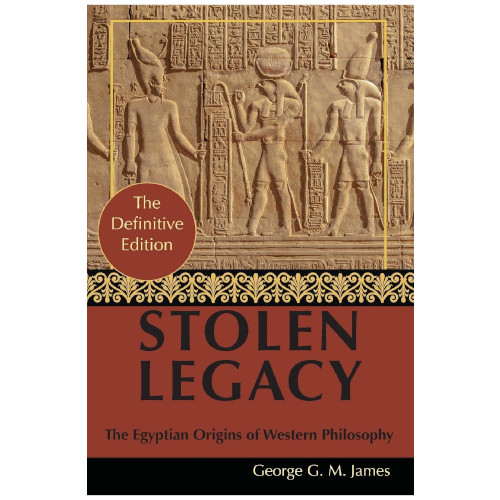Stolen Legacy: Greek Philosophy is Stolen Egyptian Philosophy
In this bold and uncompromising book, George G. M. James argues that the “Greek philosophy” in which nearly all of Western culture has its roots actually originated in ancient Egypt. Drawing on careful historical research and a radical rethinking of the conventional narrative of Greek history, James asserts that our celebration of the ancient Greeks as the creators of Western civilization and philosophy is mis-attributed. In fact, he argues, our praise rightfully belongs to the people of Africa.
Furthermore, this massive intellectual and cultural theft has helped lend credence to the damaging notion that the entire continent of Africa has contributed nothing to world civilization. James explorers documented connections between celebrated Greek philosophers and the influence of Egyptian thought, proposing other possible links between northern Africa and Greece as well.
CHAPTER I
Greek Philosophy is Stolen Egyptian Philosophy
The Teachings of the Egyptian Mysteries Reached Other Lands Many Centuries Before It Reached Athens.According to history, Pythagoras after receiving his training in Egypt, returned to his native island, Samos, where he established his order for a short time, after which he migrated to Croton (540 B.C.) in Southern Italy, where his order grew to enormous proportions, until his final expulsion from that country. We are also told that Thales (640 B.C.) who had also received his education in Egypt, and his associates: Anaximander, and Anaximenes, were natives of Ionia in Asia Minor, which was a stronghold of the Egyptian Mystery schools, which they carried on. (Sandford’s The Mediterranean World, p. 195–205). Similarly, we are told that Xenophanes (576 B.C.), Parmenides, Zeno and Melissus were also natives of Ionia and that they migrated to Elea in Italy and established themselves and spread the teachings of the Mysteries.
In like manner we are informed that Heraclitus (530 B.C.), Empedocles, Anaxagoras and Democritus were also natives of Ionia who were interested in physics. Hence in tracing the course of the so-called Greek philosophy, we find that Ionian students after obtaining their education from the Egyptian priests returned to their native land, while some of them migrated to different parts of Italy, where they established themselves.
Consequently, history makes it clear that the surrounding neighbours of Egypt had all become familiar with the teachings of Egyptian Mysteries many centuries before the Athenians, who in 399 B.C. sentenced Socrates to death (Zeller’s Hist. of Phil., p. 112; 127; 170–172) and subsequently caused Plato and Aristotle to flee for their lives from Athens, because philosophy was something foreign and unknown to them. For this same reason, we would expect either the Ionians or the Italians to exert their prior claim to philosophy, since it made contact with them long before it did with the Athenians, who were always its greatest enemies, until Alexander’s conquest of Egypt, which provided for Aristotle free access to the Library of Alexandria.
The Ionians and Italians made no attempt to claim the authorship of philosophy, because they were well aware that the Egyptians were the true authors. On the other hand, after the death of Aristotle, his Athenian pupils, without the authority of the state, undertook to compile a history of philosophy, recognized at that time as the Sophia or Wisdom of the Egyptians, which had become current and traditional in the ancient world, which compilation, because it was produced by pupils who had belonged to Aristotle’s school, later history has erroneously called Greek philosophy, in spite of the fact that the Greeks were its greatest enemies and persecutors, and had persistently treated it as a foreign innovation. For this reason, the so-called Greek philosophy is stolen Egyptian philosophy, which first spread to Ionia, thence to Italy and thence to Athens. And it must be remembered that at this remote period of Greek history, i.e., Thales to Aristotle 640 B.C.–322 B.C., the Ionians were not Greek citizens, but at first Egyptian subjects and later Persian subjects…
Based on 0 reviews
Be the first to review “Stolen Legacy: Greek Philosophy is Stolen Egyptian Philosophy”
General Inquiries
There are no inquiries yet.













There are no reviews yet.